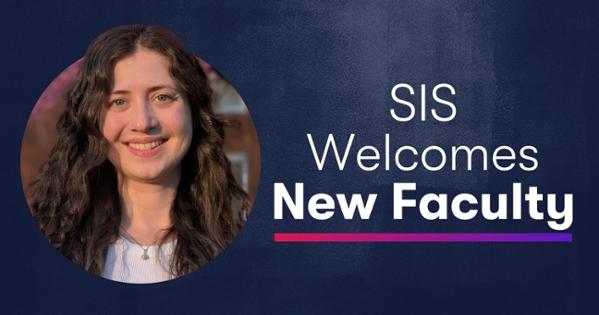American University
International
SIS Welcomes Tereza Varejkova

We are honored to begin the fall semester by welcoming new SIS faculty members who bring their expertise and unique research backgrounds to the classroom. Among our new faculty members is Tereza Varejkova, who is joining the Department of Politics, Governance, and Economics. Varejkova earned her PhD in Economics from the University of Maryland at College Park. She is an applied microeconomist who studies, among many things, the intersections of development and environmental economics. We are excited to welcome Varejkova and all of our new faculty to the SIS community!
- What are your main research areas?
- My research lies at the intersection of development and environmental economics. More specifically, I study how infrastructure, technology, and environmental factors shape economic development.
- What classes are you teaching at SIS this year? Why are these topics important for SIS students to study?
- In the fall semester, I will teach Essentials of Economics and Data Analytics. I believe that economics is an essential field for anyone interested in understanding how societies are organized and how policy is made, both domestically and internationally. Contrary to popular belief, economics is not only about money and stock markets. It provides a framework for making informed decisions in everyday life, such as whether to pursue higher education, when to purchase a home, and how to allocate scarce resources in general. Studying economic models helps students develop critical thinking skills that they can further apply in other academic and professional contexts.
- In the spring semester, I will teach Development Economics. This course is particularly valuable for SIS students who want to understand current international policy debates through the lens of economic theory. Students will also learn how to evaluate the effectiveness of policies, and the course will equip them with the necessary statistical tools and knowledge of where to find the relevant data.
- Before pursuing your PhD in economics, you completed impact evaluations of programs in Paris and in West Africa. Can you discuss what these experiences were like and explain how evaluating these programs influenced your research interests?
- Before starting my PhD, I worked as a research assistant at J-PAL Europe in Paris and as a research manager at the Center for Evaluation and Development (C4ED) in Mannheim, Germany. Both experiences were formative, giving me first-hand insight into the technical details and complexities of implementing large-scale research projects. I learned how to communicate effectively with key stakeholders and secure their buy-in for rigorous evaluations. I also learned the importance of anticipating potential problems before they arose. These projects were often very costly, and even small mistakes can have significant consequences for a study’s ability to answer its core research questions. At C4ED, I also gained valuable field experience, spending several months on the ground in Benin, Burkina Faso, Malawi, and Georgia, where I worked on preparations for impact evaluations and survey rollouts. This fieldwork solidified my research interest in sub-Saharan Africa. While I have since shifted toward using secondary data sources in my research, at least for now, these experiences continue to influence the type of big research questions that I am asking.
- What are you looking forward to most about joining the SIS community?
- I’m really looking forward to becoming part of the SIS community—getting to know my colleagues, learning from their experiences, and collaborating on new research ideas. I’m also excited to meet my students. As one of the top 10 programs in international relations, SIS attracts exceptionally talented and motivated students, and I look forward to teaching and mentoring them as they prepare to make a difference in the world.